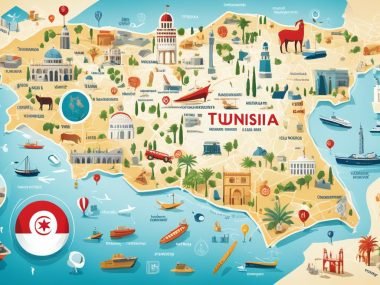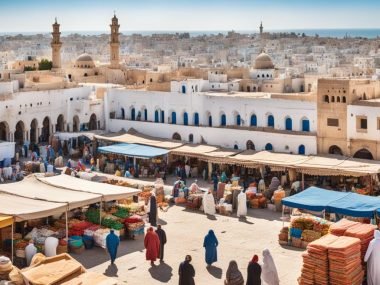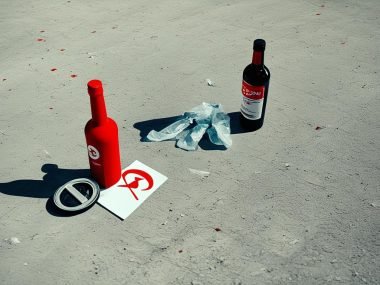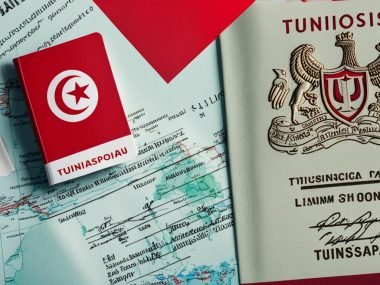Did you know the FCDO suggests not traveling to parts of Tunisia? This is because of dangers from terrorism and military stuff near the borders. It affects British folks looking at jobs in Tunisia. Especially in places like the Chaambi Mountains National Park and areas next to Algeria and Libya.
The FCDO’s tips are super important for our safety while working overseas. They help us know about risks like terrorism and military stuff in Tunisia. This info is key to understanding work conditions there. So, it’s crucial to keep up-to-date and be careful.
Key Takeaways
- The FCDO advises against all travel to certain parts of Tunisia due to significant risks.
- Specific regions affected include Chaambi Mountains National Park and the border areas with Algeria and Libya.
- British nationals should prioritise their safety by adhering to FCDO advisories.
- These advisories are not just recommendations but essential measures for safe employment in Tunisia.
- Understanding the specific risks helps navigate the working conditions in Tunisia more effectively.
Understanding Current Travel Warnings in Tunisia
The FCDO advice gives clear warnings about travel in Tunisia. They pay special attention to the western areas near the Algerian border. These places have more terrorist activities and actions by Tunisian security.
People are advised not to visit the Chaambi Mountains National Park. Also, the military zones of Mount Salloum, Mount Sammamma, and Mount Mghila are off-limits.
Travel to the south near the Libya border is also discouraged. This is because of the terrorism risk and Libya’s ongoing conflicts. It’s vital for travellers and workers to listen to these warnings for their Tunisia employment safety.
Having the right insurance is very important too. If you travel against FCDO advice, you might not be covered by your insurance. So, staying up-to-date with travel warnings in Tunisia is key. This helps keep you safe and insured.
Workplace Security in Major Cities
It’s key to know how safe major Tunisian cities are if you’re looking for work. Public and private sectors are working hard to keep places safe.
Local Crime Rates
In Tunisia, keeping work places safe is important. But, cities do have some crime. Theft is the top crime, and it’s more common in summer.
During summer, more people report sexual harassment and attacks. If you’re seeking a job in Tunisia, be careful in busy places. Don’t show off expensive things.
Security Measures
Local authorities in Tunisia have made big steps to make workplaces safer. You’ll see lots of security in city centres, doing checks and keeping order.
These efforts help everyone feel safe. Making sure to follow local advice can also make you safer. This will help make your work experience in Tunisia better.
Regional Risks and How They Affect Employees
In Tunisia, safety can be different in each area, affecting workers in many ways. It is very important to understand the risks in each region. This helps keep workplaces safe.
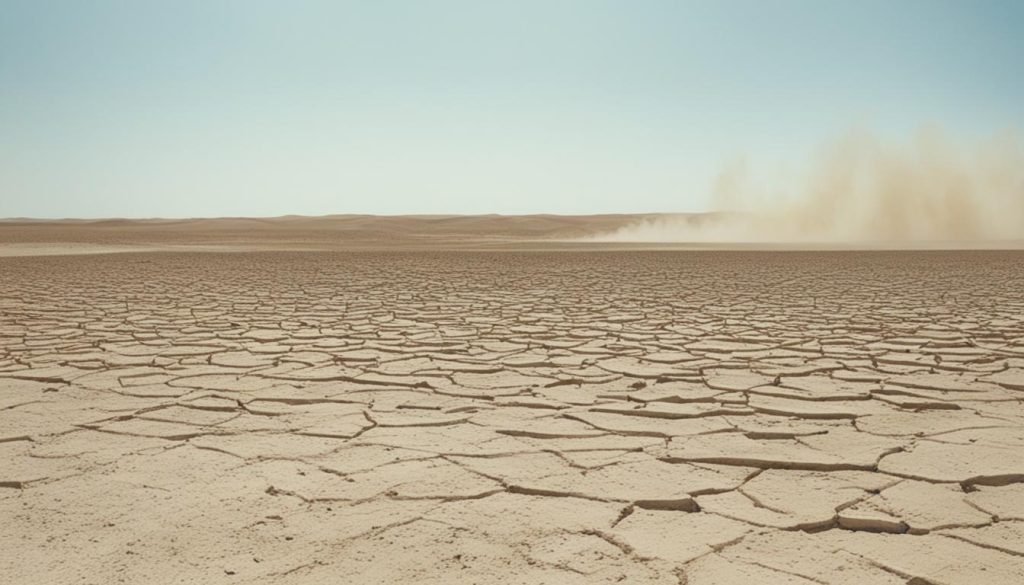
Border Areas
Workers near the borders face more dangers. The areas next to Algeria and Libya are not very safe. This is because of terrorism and political trouble. These border areas need more attention to safety.
It’s crucial to make sure workers know about these risks. This helps in preventing dangers.
Internal Risks
Terrorism inside the country is also a big problem. Recent attacks on security forces show the risks in some places. Such dangers require good safety plans at work.
We must always be alert and follow safety rules. This keeps workplaces safe.
Health and Safety Precautions for Workers
Health and safety in Tunisia is very important for workers. Rules can change quickly. Workers need to follow local guidelines, which may be different in each area.
Health advice changes often. So, employees should watch out for new information. Following local safety rules helps keep everyone safe.
- Stay informed: Regularly consult local news and official channels for any health and safety updates pertinent to your area.
- Follow official guidelines: Compliance with any specified health protocols is essential to avoid penalties and ensure personal safety.
- Be prepared: Maintain a readiness to adapt to new safety measures as they are implemented.
So, keeping up with safety rules is key in Tunisia. Always be ready to change with new health rules. This helps keep everyone healthy and safe.
Transportation Safety for Commuters
Keeping safe while commuting in Tunisia is very important. People must know about safe transport options. Let’s look at the three main ways to travel and their safety tips.
Public Transport
Public transport like buses and trains can be very busy. This makes it easy for thieves to steal. Stay alert and keep your stuff safe to avoid theft. Knowing your environment helps keep you safe from crime.
Road Travel
Driving has its problems. Cars might not be well-kept, and roads can be dark at night. Also, some people don’t follow traffic rules well. To stay safe, know the local driving laws and be extra careful at night.
Taxi Services
Choose only official taxis to avoid tricks. Make sure the taxi meter is on to avoid paying too much. Smart choices can make taxi rides safer in the city. Official taxis are a safer way to travel.
How Safe Is Tunisia To Work?
In our quest to understand workplace safety in Tunisia, experiences vary widely. But, many agree on one thing: security is tight. Stringent measures are in place to keep workers safe.

Employee Experiences
Workers often talk about the safety steps they see every day. They go through many security checks. And, they see lots of security staff around. This shows how serious Tunisia is about keeping people safe at work.
Employer Safety Protocols
Employers in Tunisia must follow strict safety rules. They work hard to prevent any dangers. This means doing things like emergency plans and crisis handling. Keeping workers safe is a big deal. Regular drills and updates on safety are common. These steps show how committed they are to security at work.
Together, the careful actions of both workers and bosses make Tunisia a safe place to work. Everyone focuses on staying safe.
Legal and Cultural Considerations for Foreign Workers
Foreign workers in Tunisia face important legal and cultural rules. Understanding and respecting these is key for fitting in and following the law.
ID and Documentation
In Tunisia, foreign workers must always have a form of ID, like a passport copy. This is to make sure local authorities can quickly check who you are. It’s wise to keep your original passport safe and carry a photocopy instead.
Dress Code
Wearing the right clothes is very important in Tunisia. Foreign workers must dress modestly. This is especially true at religious sites or less touristy places. Men should wear long trousers and not sleeveless shirts. Women should cover their shoulders and knees. This shows respect and helps fit in with locals.
Respecting Ramadan and other religious events is also key. During Ramadan, don’t eat, drink, or smoke in public during the day. It’s important to follow local laws on alcohol and drugs too, to avoid trouble.
Terrorism and Political Instability
Tunisia has a high threat level from terrorism. This means both locals and foreigners must be careful. They should avoid crowded places that tourists like.
This heightened Tunisia terrorism risk means staying alert. Everyone must follow safety tips from the authorities.
Tunisia also deals with political instability. There are often protests and strikes. These can disrupt daily life and make it unsafe.
The government gives advice on handling these problems. This advice helps keep everyone, including foreigners, safe.
It’s very important to keep up with news in Tunisia. Check reliable sources like government advisories regularly. This helps you stay safe.
Following safety tips is crucial. It helps protect you when there’s trouble or political instability in Tunisia.
To work or travel safely in Tunisia, understand these risks. Being prepared and careful is essential. This helps you deal with Tunisia terrorism risk and political troubles.
Conclusion
Looking at work safety in Tunisia means seeing the big risks. These include terrorism, political troubles, and travel cautions from the FCDO. But, Tunisia is fighting back with tight security and rules to keep us safe at work.
Next to Algeria and Libya, we must be extra careful. Inside Tunisia, we need to stay alert to dangers and politics. It’s also important to follow local road safety rules, whether we’re driving or walking.
Understanding local laws and culture helps keep us safe and respectful. We must follow the religion and legal rules for workers from other countries. By keeping up with the FCDO’s updates and being careful, we can work safely in Tunisia.



